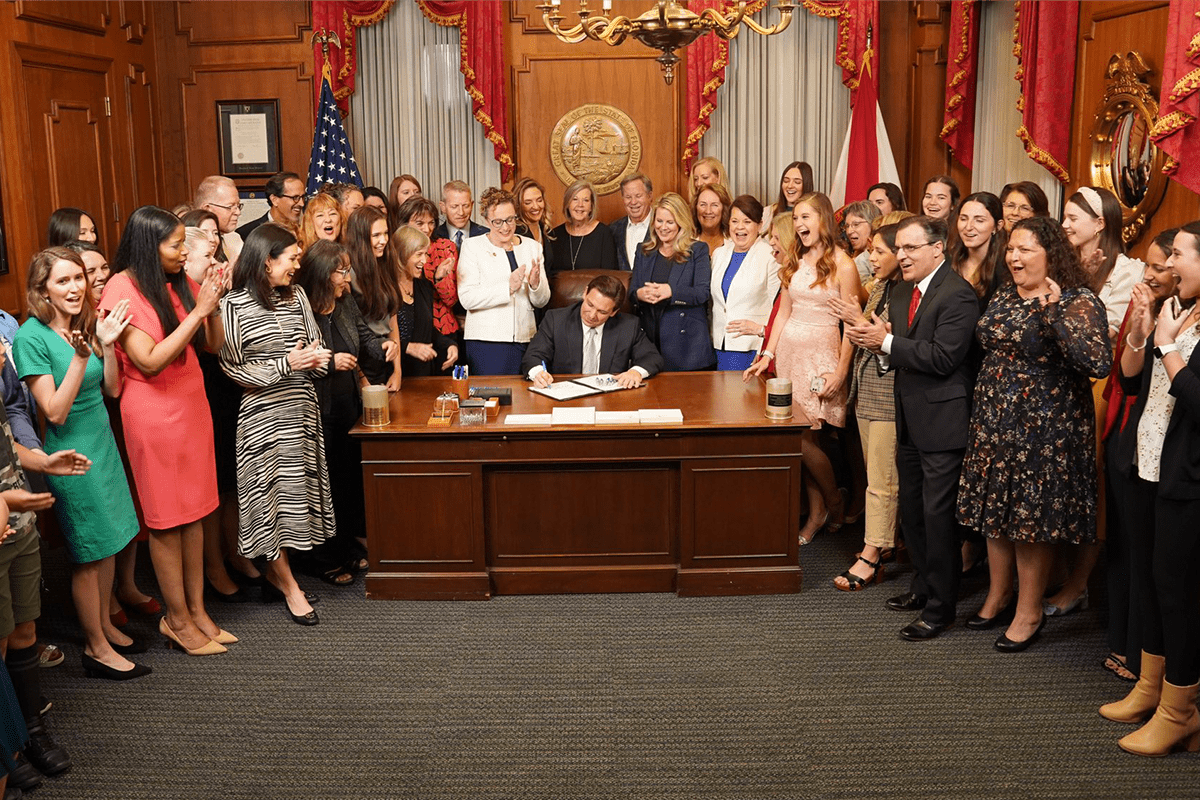DeSantis signs six-week abortion ban into law

Amber Jo Cooper and Eric Daugherty contributed to this report.
TALLAHASSEE, Fla. (FLV) – Gov. Ron DeSantis signed a six-week abortion ban into law after Florida House lawmakers approved the bill Thursday evening.
“We are proud to support life and family in the state of Florida,” DeSantis said. “I applaud the Legislature for passing the Heartbeat Protection Act that expands pro-life protections and provides additional resources for young mothers and families.”
The six-week ban is waiting for a Florida Supreme Court decision on the 15-week abortion ban before taking effect.
The House approved the Senate bill version 70-40, which includes exceptions for abortions up to 15 weeks for rape, incest and human trafficking. Other exceptions include if the mother’s life is at risk.
The House bill is co-sponsored by Rep. Jenna Persons-Mulicka, R-Fort Myers, and Rep. Jennifer Canady, R-Lakeland. Sen. Erin Grall, R-Fort Pierce, sponsored the Senate version.
The proposal also allocates millions of dollars for a family planning program and expand the Florida Pregnancy Care Network.
There is trigger language in the bill for the abortion ban to go into effect 30 days after one of the following events occurs:
- The Florida Supreme court ruling overturns one of several other related cases
- A Florida Supreme court ruling stating that the privacy clause in the Florida Constitution does not protect the right to abortion
- An amendment to the Florida Constitution which provides the same.
Rep. Kiyan Michael, R-Jacksonville, who is Black, spoke out against the high percentage of abortions occurring among Black babies.
“The reality is 40% of babies who are aborted on Black babies. We’ve seen our country torn apart. Marches, burned down because Black Lives Matter. And I agree that all lives matter,” Michael said. “But at what point do they matter? Do they not matter in the womb?”
The Senate approved the bill 26-13 on April 3 with two Republicans voting against it.
Democrats had proposed dozens of amendments on the floor – all of which were shot down Thursday.
House Minority Leader Frentrice Driskell, D-Tampa, said the bill amounts to an “outright ban.”
“This is not reasonable because it amounts to an outright ban. Most women don’t know that they are pregnant at six weeks,” Driskell said. “You just don’t want women to have choice.”
Some amendments that were not approved included requiring crisis pregnancy centers disclose that they are not medical providers, labeling the bill the “Forced Pregnancy Act,” and allowing abortions if the woman is experiencing conditions including a bleeding disorder, kidney disease and other conditions.
Another amendment by Rep. Anna Eskamani, D-Orlando, was regarding Florida’s 24-hour waiting period for an abortion. She said her amendment would get rid the delay.
“I would argue there’s tension between the 24-hour delay and the six-week abortion ban because there ain’t no time to think about it,” Eskamani said.
In order to qualify for the rape, incest, or human trafficking exception, the woman would need to provide a copy of a restraining order, police report, medical record, or other court documentation providing evidence that she is obtaining the abortion because she is the victim of rape or incest.
If the woman is a minor, the bill requires that the physician report the incident of rape or incest to the central abuse hotline.
It clarifies the exception for fatal fetal abnormalities is available until the third trimester, rather than until viability.
In non-emergency situations, two physicians would need to certify in writing that the termination is necessary to save a woman’s life, if the gestational age of the fetus is more than six weeks.
In an emergency situation, it requires a physician to certify in writing that there is a medical necessity for legitimate emergency medical procedures if the gestational age of the fetus is more than six weeks.
The bill specifies that abortions may not be provided through telehealth and that medication intended for the use in a medical abortion may only be dispensed by a physician and may not be dispensed via the U.S. Postal Service or by any other carrier.
It will also prohibits any person, educational institution, and governmental entity from expending state funds for a person to travel to another state to receive services that are intended to support an abortion, unless such expenditure is required by federal law or there is a legitimate medical emergency.
The bill provides exceptions for when such expenditure is required by federal law, and for emergency situations.
$5 million in recurring funds will be used for the family planning program, which is implemented by the Department of Health.
The bill also expands the Florida Pregnancy Care Network to expand eligibility for such services to women who have given birth in the past 12 months and to parents or guardians of children under the age of three for up to 12 months.
The Florida Pregnancy Care Network is a not-for-profit statewide alliance of pregnancy support organizations that provide pregnancy support and wellness services through a comprehensive system of care to women and their families.
The bill appropriates $25 million in recurring general revenue for the expanded network and specifies that contracted organizations in the network must spend at least 85% of the funds received on providing services and maintaining a hotline.
The bill adds new services and assistance which the network is required to provide, including counseling, mentoring, educational materials, and classes as well as material assistance including clothing, car seats, cribs formula, and diapers.
The legislation also requires that the Department of Health report to the governor and the Legislature annually on the types, amount, and costs of services provided as well as demographic information on persons who receive such services.
Editor’s note: This story has been changed to reflect Gov. Ron DeSantis’ signing of the bill late Thursday night.



